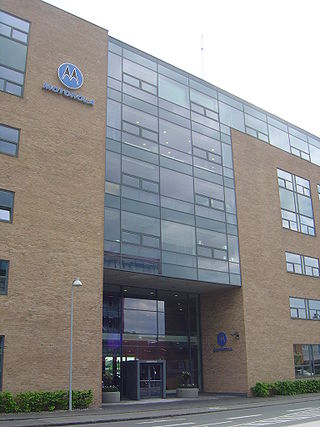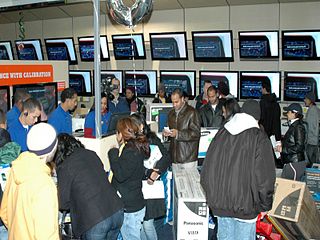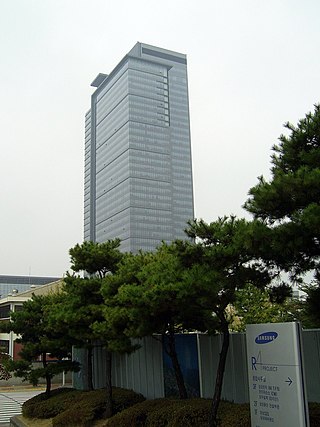
Motorola, Inc. was an American multinational telecommunications company based in Schaumburg, Illinois. It was founded in 1928 as Galvin Manufacturing Corporation by brothers Paul and Joseph Galvin. The company changed its name to Motorola in 1947. After having lost $4.3 billion from 2007 to 2009, Motorola was split into two independent public companies, Motorola Mobility and Motorola Solutions, on January 4, 2011. The reorganization was structured with Motorola Solutions legally succeeding Motorola, Inc., and Motorola Mobility being spun off.

Palm, Inc., was an American company that specialized in manufacturing personal digital assistants (PDAs) and developing software. Palm designed the PalmPilot, the first PDA successfully marketed worldwide, and was known for the Treo 600, one of the earlier successful smartphones. Palm developed the Palm OS software for PDAs and smartphones released under its line of Palm-branded devices and also licensed to other PDA manufacturers.

Consumer electronics or home electronics are electronic equipment intended for everyday use, typically in private homes. Consumer electronics include devices used for entertainment, communications and recreation. These products are usually referred to as black goods in American English, due to many products being housed in black or dark casings. This term is used to distinguish them from "white goods", which are meant for housekeeping tasks, such as washing machines and refrigerators. In British English, they are often called brown goods by producers and sellers. In the 2010s, this distinction is absent in large big box consumer electronics stores, which sell entertainment, communication and home office devices, light fixtures and appliances, including the bathroom type.
Sony Mobile Communications Inc. was a multinational telecommunications company founded on October 1, 2001, as a joint venture between Sony Corporation and Ericsson. It was originally incorporated as Sony Ericsson Mobile Communications, and headquartered in London, England, until Sony acquired Ericsson's share in the venture on February 16, 2012. On April 1, 2021, Sony integrated its electronics businesses including Sony Mobile into one company called Sony Corporation.

LG Electronics Inc. is a South Korean multinational major appliance and consumer electronics corporation headquartered in Yeouido-dong, Seoul, South Korea. LG Electronics is a part of LG Corporation, the fourth largest chaebol in South Korea, and often considered as the pinnacle of LG Corp with the group's chemical and battery division LG Chem. It comprises four business units: home entertainment, mobility, home appliances & air solutions, and business solutions. LG Electronics acquired Zenith in 1995 and is the largest shareholder of LG Display, the world's largest display company by revenue in 2020. LG Electronics is also the world's second largest television manufacturer behind Samsung Electronics. The company has 128 operations worldwide, employing 83,000 people.

HTC Corporation, or High Tech Computer Corporation, is a Taiwanese consumer electronics corporation headquartered in Taoyuan District, Taoyuan, Taiwan. Founded in 1997, HTC began as an original design manufacturer and original equipment manufacturer that designed and manufactured laptop computers.

Motorola Mobility LLC, marketing as Motorola, is an American consumer electronics manufacturer primarily producing smartphones and other mobile devices running Android. Headquartered at Merchandise Mart in Chicago, Illinois, it is a wholly owned subsidiary of the Chinese technology company Lenovo.
The term mobile commerce was originally coined in 1997 by Kevin Duffey at the launch of the Global Mobile Commerce Forum, to mean "the delivery of electronic commerce capabilities directly into the consumer’s hand, anywhere, via wireless technology." Many choose to think of Mobile Commerce as meaning "a retail outlet in your customer’s pocket."
Lively is a connected health technology company based in the United States of America.

Belkin International, Inc., is an American consumer electronics company headquartered in El Segundo, California. It produces mobile and computer connectivity devices and peripherals for consumer and commercial use. These include wireless chargers, power banks, charging cables, data cables, audio and video adapters, headphones, earbuds, screen protectors and cases, surge protectors, docking stations and data hubs, secure KVM switches and network cables.
In electronics, refurbishment is the practice of restoring and testing a pre-owned electronic device so that it can be re-sold. Refurbished electronics are therefore pre-owned electronic devices, that have been tested by a reseller to confirm that they are fully working. Other refurbished electronics include smartwatches, games consoles, and cameras.
UNISOC, formerly Spreadtrum Communications, Inc., is a Chinese fabless semiconductor company headquartered in Shanghai which produces chipsets for mobile phones. UNISOC develops its business in two major fields - consumer electronics and industrial electronics. Consumer electronics includes smartphones, feature phones, smart audio systems, smart wearables and other related devices. Industrial electronics cover fields such as LAN IoT, WAN IoT and smart displays.

Mobile phone recycling describes the waste management of mobile phones, to retrieve materials used in their manufacture. Rapid technology change, low initial cost, and planned obsolescence have resulted in a fast-growing surplus, which contributes to the increasing amount of electronic waste around the globe.
Recommerce or reverse commerce is the selling of previously owned, new or used products, mainly electronic devices or media such as books, through physical or online distribution channels to buyers who repair, if necessary, then reuse, recycle or resell them.
Apple Inc. v. Samsung Electronics Co., Ltd. is the general title of a series of patent infringement lawsuits between Apple Inc. and Samsung Electronics in the United States Court system, regarding the design of smartphones and tablet computers. Between them, the two companies have dominated the manufacturing of smartphones since the early 2010s, and made about 40% of all smartphones sold worldwide as of 2024. In early 2011, Apple initiated patent infringement lawsuits against Samsung, who typically responded with countersuits. Apple's multinational litigation over technology patents became known as part of the smartphone wars: extensive litigation and fierce competition in the global market for consumer mobile communications.

NextWorth Solutions, Inc., was an electronics trade-in and recycling service. Users of the service exchange used electronics for cash or discounts on newer models. NextWorth was founded by business students at Babson College in 2005. It started as a commission-based service to help businesses setup online auctions for their used items, then changed its business model to focus on electronics trade-ins in 2006. As of late 2012, NextWorth was one of the best-known and largest electronics trade-in and recycling services in the United States, although it handles only a small percentage of total trade-in traffic.

uSell is a publicly traded recommerce company with headquarters in New York City. It operates as an online marketplace where people can sell used cell phones, tablets, video games, textbooks and gift cards to professional buyers.

Samsung Electronics Co., Ltd. is a South Korean multinational major appliance and consumer electronics corporation founded on 13 January 1969 and headquartered in Yeongtong District, Suwon, South Korea. It is currently the pinnacle of the Samsung chaebol, accounting for 70% of the group's revenue in 2012, and has played a key role in the group's corporate governance due to cross ownership. It is majority-owned by foreign investors.
Right to repair is a legal right for owners of devices and equipment to freely modify and repair products such as automobiles, electronics, and farm equipment. Right to repair may also refer to the social movement of citizens putting pressure on their governments to enact laws protecting a right to repair.

Compare and Recycle is an independent UK-based online comparison website for electronics recycling. It is owned and operated by Atom Juice Limited. The website is registered in Maidstone, England, and focuses on recycling of mobile phones, tablets, smartwatches, digital cameras, headphones and other devices.












